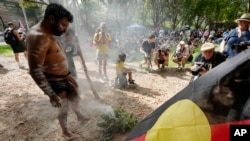An international conference in Australia of First Nations people is calling on scientists to engage with Indigenous experts to find solutions to climate change.
Indigenous Australians consider the land to be the mother of creation. To them, it is a living, breathing mass that contains secrets and wisdom.
Tribal leaders have gathered in Dubbo, 390 kilometers northwest of Sydney, to urge governments and scientists to do more to harness the knowledge of First Nations peoples to combat climate change.
In an official video, Glen Wingfield of the Kokatha Aboriginal Corporation in South Australia said the conference is part of a growing movement.
“We get on top of this (and) try to slow this global warming and all that stuff and get the message out to young people," Wingfield said. "We need more and more voices. If there is one or two people, you go and knock at the door, they tell you to go away. If you are going to come with a big mob, now they are going to start listening.”
Indigenous communities around the world have relied on a deep understanding of their environments to survive.
Kyle Whyte, professor of Environmental Justice at the University of Michigan, is attending the summit as a science envoy for the U.S. State Department.
He has said previously that First Nations people around the world have already been through an environmental "apocalypse" because of the theft of customary lands.
He told the Australian Broadcasting Corp. Tuesday that the impact of dispossession continues to this day.
“Going back several centuries it was Indigenous peoples’ lands that were first sacrificed to make way for mining and other industries that we now know are responsible for human-caused climate change,” he said.
The Canadian government has set up a partnership with Indigenous people to help tackle climate change. In 2023, the Ottawa government said, “First Nations, Inuit, and Métis in Canada are at the forefront of efforts to…adapt to the impacts of our changing climate.”
In New Zealand, authorities have acknowledged that for many Indigenous Maori, climate change “is not an isolated risk” but is “intrinsically linked to other issues, such as social development needs, housing, environmental degradation…and poverty.”
Indigenous elders have said that the First Nations people of Australia, who make up about 3% of the national population, contribute the least to climate change, “yet the impacts of climate change are affecting us most severely.”
The climate summit in Dubbo runs Oct 14-18 and is jointly run by the local Tubba-Gah Wiradjuri Aboriginal Corporation.
